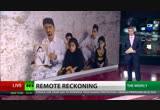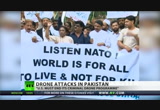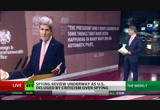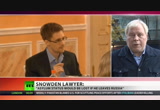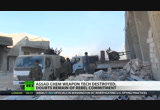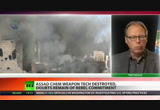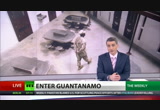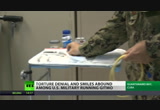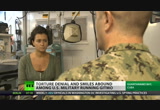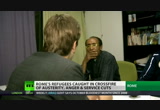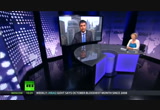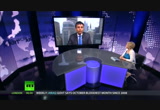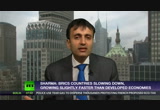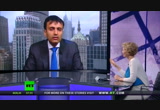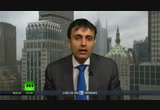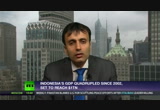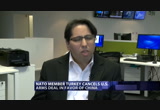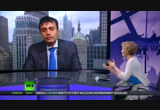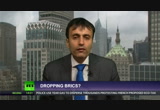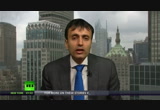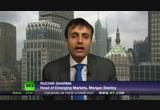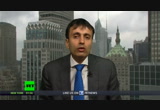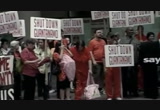tv To Be Announced RT November 3, 2013 1:00am-1:01am EDT
1:00 am
my mother was killed my children were in germany i'm so glad the people who go to iraq story. see. the us congress full of horrors of a cia drone strike. e.u. officials head to washington hoping the truth about a. program which millions of europeans have found themselves being targeted by but it's worse for obama not to have known who's running the show the country's leadership seems to be rather unclear on what its national security agency is doing a bit later here on the program. and the syrian government dismantle its chemical production facilities. as some rebel groups continue to defy that feel. some water in the. back here before it's passed on the news we lubricated
1:01 am
the smiles of the u.s. military officers the painful force feeding of detainees at guantanamo bay. we report from inside the complex. timing for the opening of the weekly program. live in moscow from the news team welcome putting a human face to america's so-called war on terror in pakistan a family of drone strike victims testified in front of congress this week having lost their grandmother and what was reported as a persistent strike on. u.s. lawmakers why their home was targeted in the first place. it was at the briefing. this was the first time actual victims of u.s.
1:02 am
drone strikes were in congress and apart from the congressman who initiated this briefing i saw only four other members of congress it's no secret the u.s. congress generally approves of growth strikes so it's very difficult to expect a sudden change of heart even though heart was with these drone victims were appealing through one of the twenty fourth of last year a u.s. drone strike left this pakistani family devastated a nine year old girl and her thirteen year old brother nearly escaped death that day their sixty seven year old grandmother was killed that's the full pardon me i no longer love blue skies i prefer the gray skies the drones do not fly when this kinds agree and for a short period of time the mental time and fear eases but when this the drones return and so does the fear you know this family has never been abroad out of their home in north waziristan and the father of this family said he looked at the life around here. he wished his children to be able to walk the streets not afraid of
1:03 am
being bombed at any moment. my mother was killed my children were injured i'm so glad that people are going to hear our story that's why we came to america i have no idea why our village in my house is talking to. the family came to washington of course hoping to get answers to why they have to live in fear every day i have no idea why my grandmother was killed when the drone hate i was outside with my grandmother everything became dark i was scared so i started to run then i noticed my hand was bleeding so i tried to clean my hand but a lot kept coming out but i was very scared so i just kept running. we also learned that the u.s. government did not grant to the lawyer of this family a prominent practice any lawyer who has sued the cia in the past on behalf of the victims of drone strikes in pakistan four hundred fifty thousand population of. music. you know concentration. on this is what trying to
1:04 am
do to showing how long for someone. that this is. and at the same time to nor to be in a position to leave you the purpose of this briefing was to put a human face to drone strikes there's a chance that in congress the tragedy of this family will fall on deaf ears but there is hope that the public now is in washington i'm going to check out. and i'm on a b.p. was among the up to nine hundred civilian fatalities estimated by rights groups since the drone strikes began in pakistan in two thousand and four and i'm just the international report published just last week so these unlawful killings could amount to war crimes something that activist brian becker tends to agree with if nothing shocks the conscience of the congress like this nothing ever will we see that this is a criminal action by the u.s.
1:05 am
government those drone pilots who carried out the direct violent death of this sixty seven year old grandmother they should be arrested and so should their superiors it's not acceptable for a lawless a program like the drone attacks that targeted killings of people all over the world by the united states government unilaterally deciding who lives and who dies it's not acceptable to have a series of endless a partial apologies or compensations for the people they call collateral damage the program is inherently criminal it's outside the laws of the international community it's outside the un charter the united states government is the only government in the world that dares to irrigate to itself the right to carry out targeted assassinations of whoever it decides should be killed. are still to come of the program here on r t striking down the peace process u.s. drone attack kills a taliban leader who was poised to hold talks with the pakistani government.
1:06 am
are now in the program a group of angry e.u. officials has been spending this week in washington d.c. seeking the truth about america's ongoing global surveillance operations a europe has stressed repeatedly that spying is not what friends and allies do when such activities will not be tolerated germany even sent its own delegation to the white house to investigate the revelations the u.s. tapped chancellor merkel's mobile phone mounting questions on criticism of push president obama to launch a review of the country's intelligence operations but it seems that europeans were not the only ones kept in the dark over the n.s.a.'s practices for example the secretary of state john kerry he claimed that both he and president obama were not aware of many of the things that the n.s.a. does saying the agency runs certain operations on autopilot because they have the technology and the ability to do so now contrast this with a statement by the n.s.a. chief keith alexander he said his agency is told who to spy on by the policymakers
1:07 am
and xander pointed out that u.s. ambassadors were also among those advising on the snooping ray mcgovern who worked as a cia officer under seven different u.s. administrations he says if president obama doesn't really know what the n.s.a. is doing then there are many very serious questions to be answered. i think in many ways it's worse for obama not to have known who's who's running the show it where does the buck stop so equally bad is that he knew or he didn't and now this back filling in this real vendetta between the n.s.a. chiefs who were shown to be very fast and loose with the truth. alexander for one and then clapper who. was the head of the intelligence apparatus who is it made it to lying to the congress felony that they are to sort of try to defend themselves by telling everyone they told the president every i don't know whom to believe because both sides have been very sparing with the truth. well in its
1:08 am
search for the truth about america's spying in germany has now reached out to the one person behind the global scandal of course none other than edward snowden a green party m.p. has met with the fugitive will supply we're here in moscow to discuss his an assistance in a potential investigation into the n.s.a.'s operations he says the words of the u.s. now can no longer be trusted. sean basically you move because i think it's important to work together with mr snowden rather than putting him in prison we'd like more clarity on these allegations and we want to make sure something like this doesn't happen again snowden worked for many years for the cia and n.s.a. so i'm sure you can tell us everything we need to know about the leaked documents because as we've seen the n.s.a. has been very scarce with providing information and i also think that the organization including n.s.a. chief keith alexander aren't always being truthful they once claimed they'll never
1:09 am
break german laws on their surveillance operations but tapping the chancellor's phone is not legal that's why i have trouble trusting u.s. intelligence officials. and a lawyer who's been helping edward snowden and his attempts to avoid u.s. prosecution explain why his client will have certain difficulties aiding german officials despite its willingness to help. one of those over in europe of course edward snowden can't leave russia because he's got refugee status here and if he travels to a different country he loses it so if germany has any questions for mr snowden that this could be resolved through treaties exist between germany and russia and edward wouldn't have to travel there to testify to the level of danger still high that we hear comments from the u.s. government almost on a daily basis that edward is still on the wanted list we've done everything possible to ensure the security as far as surveillance and wiretapping goes i
1:10 am
wouldn't comment on that because those who have been following the situation around snowden know what u.s. intelligence is capable of. or you can always log onto r.t. dot com for the latest updates or videos and expert analysis on the ongoing n.s.a. scandal. ten minutes past the hour here in the russian capital the chemical disarmament of syria reached its first milestone this week as the war torn country successfully dismantled most of its active toxin production facilities the two sides could not be reached by inspectors due to the ongoing heavy fighting in those areas syria though now has two weeks to agree with the world's chemical weapons watchdog on our roadmap to destroying all of its remaining toxic agents. has this report from damascus dangerous and dirty that's how the nobel prize committee described the work of chemical weapons inspectors inside syria not to mention a brutally tight deadline october twenty five damascus provides
1:11 am
a detailed plan of its chemical weapons stockpiles done october twenty seven foreign inspectors visited all declared sites missed. syria finishes destroying all equipment used in the production and mixing of poison gas and nerve agents done we eliminate. whatever we can but you know this is a very complicated the process complications filled by so called security concerns and that's the reason why one deadline already has been missed one of the biggest problems the train faces is how to access sites in rebel controlled areas so far the rebels have been unwilling to cooperate for an inspectors have managed to visit twenty one of twenty three sites and although they haven't verbally blamed the rebels damascus insists it's doing its share until now. those. sites being visited are under government control and we hope those who are
1:12 am
controlling. the group still them to implement what they are expected to implement it's the most difficult mission if undertaken by the organization for the prohibition of chemical weapons destroying a country's chemical weapons stockpile in the midst of a civil war two women are syria actually stopped producing chemical weapons in one thousand nine hundred eight as a possessed alternatives that can be a strategic substitution and are not in conflict with international law but none of this answers the reason why foreign inspectors are in damascus in the first place a chemical attack on august twenty first in which hundreds of people were killed off two rockets with sarin gas were fired at damascus as suburbs those responsible are still at large the next deadline in the destruction of syria's chemical weapons program is the middle of next year by then damascus must have destroyed over moved its entire stockpile and ambitious timeline in very difficult circumstances policy r t damascus
1:13 am
a spokesman of the chemical weapons watchdog told us earlier they have a tough job on their hands with syria but have already made great progress though towards complete disarmament. we're doing a lot better than a lot of people would have expected. in right now it's a little bit early to speculate on the arrangements that are going to be made to get on with the destruction of the stockpile as it's been speculated on publicly some of that stockpile may have to be moved out of the country to a safer location where it can be destroyed using you know incineration or hydro visitations some method that's used to destroy chemical weapons agent but we're not there yet we'll have more details on after the fifteen from the number one this one this find of destruction and provided. are just a few minutes away here on the program failed expectations. it's like.
1:14 am
meeting. with a correspondent desperate immigrants some of. the countries in the first place. do you think your argument. for. example. muslim democracy that was able to separate the its religion from its economy still can be applied to these day that's a point what i spoke about in the book was how he had done so being accompanied by . a good old so it she's so much economic success and i think that was great but the problem there is of course i do want. to do what has changed he now has become much more. criticism and bad annoyed.
1:15 am
good luck. to build. anything mission to teach creation why it should care about humans. this is why you should. only. it's a good to have you with us for the weekly. more than a dozen detainees continue their hunger strike guantanamo bay prison in protest of being held indefinitely without charge most of them are being force fed and described by human rights groups. but the u.s. military continues to defend its practice. now reports from inside the
1:16 am
notorious prison. every morning at eight am the u.s. national anthem erupts across the beast that holds america's most scandalous prison no one likes to be spit on no one wants to have their own on torture hunger strikes and suicides have marred this place since two thousand and two and they're human beings after all they're there's no reason to expect that they enjoy being here you know we pretend otherwise prisoners held indefinitely in the name of the never ending war on terror whether they're innocent or guilty is not our job right here j t f you know we have the court system to time and that in just over a decade a total of seven hundred seventy nine prisoners the majority released without charges today one hundred sixty four remain over half of them cleared for release but still kept locked up. on the other side of the barbed wire. life is a blast. furnace and water and it's nice there's nothing really bad about here
1:17 am
just like any common american town now is awfully scared to come here but i mean it's absolutely a beautiful place and you get around other stuff getting around the other stuff is not hard a lot of what goes on here is kept under a thick veil of denial and secrecy candle to house as a hospital and library and this is also the place where patients are force fed and even though the hunger strike is largely and officially said to be over we know that at least fifteen people are continually being force fed here today a tube is passed down through a person's nostril and pushed all the way down to their stomach before it's passed down the nose we lubricate it in we give the patient a choice do they want to have the key which is agent it will numb the area or if they want olive oil to lubricate the tube.
1:18 am
most of our patients have been using olive oil you seem to like it in fact some of our patients are so used to this they will. described which nostril they want this while major world medical bodies are in agreement that force feeding is not ethical and should not be practiced the force feeding them i've got my clients have experienced at one time or they've certainly described the storage or the restraint chair that they're strapped into they actually call the torture chair an arabic force feeding takes up to forty five minutes and is performed twice a day the patients that had the civilian world have said it feel strange i've never heard insisting on. i have not heard that good move beyond nonchalant about the highly criticized practice you might feel differently from the way i might feel uncomfortable has been the most of it i have heard but they don't even believe in what this thing anymore because they know it sounds stupid i volunteer that the procedure be demonstrated on me request declined the prisoners who've not met one another and speak different languages keep saying the same thing that we were
1:19 am
tortured used. tied. to the chair legs to the ground. strap across forced in a tube into our noses never in thirteen years have detainees been allowed to speak directly to a journalist while remaining at give mo only leaking statements through lawyers they would love nothing more than to sit down with journalists and just tell them you know about their daily lives but communicating seems to only occur here if someone was it a point where maybe they had been verbalizing a lot of hopelessness we were immediately intervening and trying to assist that person to make sure that there wasn't any thoughts of maybe wanting to harm themselves or in their lives with charts like these often used to pinpoint patients despair you asked them how do you feel right now and they'll be able to point to it we have not had a patient in this area. thank heavens meanwhile six suicides and dozens of suicide
1:20 am
attempts have taken place at the detention facility we haven't seen any autopsies the u.s. government hasn't released any formal reports or findings we're now inside two active camps at guantanamo camp five full single cells where the so-called less compliant detainees are held camp number six is one filled with communal cells when officials deem that detainees have behaved better there will be warded by being allowed to live in groups while detainees are kept away from us what we witness are clean empty prison cells with cozy pajamas colgate toothpaste and maximum security shampoos paraded in front of journalists as proof everything is so much better here than any silly horror stories we all have heard and r.t. one ton of cuba you're watching the weekly on r.t. on tuesday bit coins first ever a.t.m. went online clients in the canadian city of vancouver canal swap their digital currency for real cash what exactly is bitcoin and how can you turn
1:21 am
a computer into thousand of physical money i want to give details here basically it's a currency used for online transactions and to use it client set up web wallets hiding their names behind the digital code. or the middlemen tax agencies all left out reducing fees they're the payment can still be traced next you choose whether to shop online using bitcoins or perhaps to sell them for any other currency such as the dollar or even the euro a bit coins are collected though through a process called mining which is basically a chain of computers cracking codes and getting cohens in exchange but it's not all plain sailing last month the f.b.i. shut down the online black market silk road sealing seizing i should say nearly thirty million dollars worth of bitcoins and my colleague kevin owen spoke about this to mitchell demeter from the bit of corn exchange store in vancouver. i think it definitely has the potential to be revolutionary it basically gets your cash
1:22 am
into a digital form where you can send it around the world instantly with no middleman what do the authorities think about it i mean there's an element of course there's been a worry that it's going to be transparent untraceable dodgy dealings could be done with it what are you doing to combat. we've got any money laundering policy in place where we limit users to three thousand dollars per day every transaction you make is recorded on a public ledger your name is attached to it but if somebody wants to find out who was making that transaction it can be done the silk road is a perfect example of that of shutting down the silk road that was they could be screwy and the black market e.-bay and actually shut down which is actually a very good thing for the currency as a whole as a lot of you were so it's the it is associated good morning just directly with the silk road and so since it's been shut down the currency did dip about ten percent for both twelve hours and since then people realise that it's not just about the
1:23 am
black market and it's actually a legitimate currency and it's actually gone up one hundred percent since then. now a single u.s. drone strike has destabilized the entire peace process in pakistan it's killed the leader of the country's taliban group who had been prepared to negotiate security forces now on high alert across the country over fears of a militant reprisal and one local expert told us here at r.t. the pakistani people are the ones who end up paying the price for the drone strike . the prime minister of pakistan was in washington d.c. only a week back and he had spoken to president obama taken him into confidence regarding the dialogue process and it also made a request for the drone attacks to stop because with the record taliban pakistan had made it pretty condition the drone attacks must come to an end before they come to the dialogue be able but instead of the drone attacks being stop big continued so i need body who is going to suffer it is going to be the people of pakistan and not the us the united states does not have the right to be judge jury and executor
1:24 am
all rolled into one without any authority in the wake of the biting recession many italians are complaining about the way they're being forced to live by their austerity driven government that's nothing compared to the misery that immigrants in the country now find themselves in in fact aussies are you going to skin off now reports on the fate of those who end up in squalid conditions ultimately no better than the ones they left behind. some call it a city within a city others a refugee ghetto it's like i'm here stealing african refugees from four african countries over twelve hundred people crammed inside a former university building in a room now known as palace anything that. we may get a better life here but not we weren't allowed to film inside the rooms but dr treating the refugees agreed to describe the conditions they with. their city five
1:25 am
tabs and thirty five showers and eighty percent of them need to be repaired the beds are all seen in very bad condition actually lot of people sleep in the car thousands of refugees have been flocking to italy mainly across the mediterranean in search of a better life but the country's only economic problems including the worst recession since the second world war provide very little opportunity at the same time. obliges all refugees to stay in the country where they receive asylum those who manage to avoid which stray shouldn't go further north as illegals those who don't want local shelters are running out of space for all the newcomers without a job or even a place to sleep where do you go for the majority it's the train stations to meeting point for possible work or some cash during the day and makeshift shelter at night which is on a bit of let me space so on sometimes immigrants from different countries fight each other like the old man and those from bangladesh for example bennies i don't
1:26 am
want this area they may get out there there are a lot of them here and in other areas nationalities at first they came from some countries now also from eastern ones the whole region is full of immigrants. a polish or a dizzying gadget and very strong activity but live well also you must be. solve this problem the e.u. has pledged to. even additional thirty million euros for italy to build more shelters for the refugees but its own lake release will help create new jobs or ease the flow of immigrants all together you've got going on r.t. road. my thanks so much for being with us here on our team today a role research and stepping aside folks on a boy a program a worlds apart investigating today of some of the globe's fastest growing economies have any chance of actually keeping up the real pace with the competition but for most of its opposite.
1:27 am
the office of civil rights in the city of seattle washington has told city employees that certain terms may not be used in official emails and discussions scoring to google fox news these terms would be brown bag and citizen ninety nine percent of americans when they hear the expression brown bag think of taking a nice healthy lunch you know in a brown paper bag to work with themselves but in a politically correct insanity land these words are an obvious reminder of the days when a person's skin color was compared to a brown paper bag to determine race well if any were even remotely like to an incident of racism needs to be banned then we've got to get rid of the word blanket because they gave the native americans disease still blankets to kill them i and they block their land with beads so we've got to get rid of that word to remember
1:28 am
the separate drinking fountains and segregated buses based on race in america yes so we can't say those words anymore either only might just possibly remember something bad which could lead to the ultimate horror of the modern western world unpleasant thoughts we see a lot of western countries the term citizen becoming offensive because it makes resident foreigners legal or illegal feel like second class people well compared to actual citizens legally you kind of are if you're offended that you are not treated as a citizen of seattle why not assimilate become a citizen of the us. join the team but the surest my opinion. wealthy british soil is on it's a spot on. the. market so why not. find out what's really happening to the global economy cars report on r t.
1:29 am
hello and welcome to worlds apart one thing in common between fund managers and fashionistas is that preoccupation with chance then i'm just we're all about the tax for the two thousand staff and today having for marching markets especially the bric countries who've collectively attempted to challenge the economic supremacy of the developed world our guest today believes that the world's fascination with brakes will be short leave them in fact is almost over but it doesn't necessarily mean the end of the rise of the rest well to discuss that i'm now joined by richard sharma who leads the emerging market team at morgan stanley mr sharma thank you very much for your time now if you break out nations took the world by storm it became a best seller almost overnight but i think one of the reasons why it was such
1:30 am
a success is because people tend to react to it in a very emotional and almost political way some people in the brics countries stupid as your prediction of the almost immediate demise and some people in the west who could as a promise of that almost immediate recovery but i guess you didn't mean either of that's right i think my point was to sort of speak about the world as i see it and i spoke about some old. brics countries do on an individual basis and as i was traveling to various places from brazil to india i was getting a sense that a sense of complacency is setting in after agreed they could last decade and that it was bound to lead to a slowdown in reforms and so therefore the good traits of these economies were bound to slow down and not to live up to the hyped up expectations so it really is . a very honest assessment of what i told would be the goods of these videos countries but i think this is where your book gats rather ambiguous and this
1:31 am
ambiguity was even better articulated in your later article in the foreign policy magazine that you there have provoked actively titled broken brakes why the rest of prizing and i think it contains two major fallacies first. the bricks and broken i mean that growth is slowing down but there are still growing there are still developing and second is that the rest didn't stop rising simply because the rest is not confined to brics countries and what is more important is that that's major transformation of global economic and political architecture away from western dominance and towards a more level playing field is still happening and if it if i think it is actually accelerating yes but italy i was to be issue with what happened last decade and lost a kid it seemed every single emerging market was going to rise very rapid peace because
1:32 am
between two thousand and three and two thousand and eight that golden era every single developing country was recording a very high growth treat almost without exception and i was taking issue with that that that is unlikely to happen the long term history of economic development is that some countries do with some countries do not do well so now look at what's happening the last couple of years the rate of growth of brazil russia south africa these countries a slowdown dramatic. d. and the forecast i make is that the growth rate of these countries in particular will not be fostered in the united states and that is a major disappointment because these countries have a per capita income what a will to live which is much lower than that of the united states the fact that these major they've gone and knees in the developing world that unlikely to grow any faster than the leading economy in the world that's the united states is i think a major disappointment but and specially compared to what happened last decade so i
1:33 am
was making the argument that what happened last decade is an exception and the not every single emerging market is going to boom and it's going to happen in a very selective manner yes but the fact that then no one rising or no developing at such a high speed as before doesn't mean that this major transformation. is not happening and the reason why i'm saying that is because obviously it's not just about how much money investors can make all of those countries i think most of those countries and all concerned for that but what they are actually interested in is changing the existing economic practices and it's not a secret that for the last couple of decades developed countries have had in a greater leverage of sort of shaping global trading practices in their favor and part of that own konami growth was conditioned on having those rules in favor of but as you have more countries stepping into the fold you will also have more power
1:34 am
sharing and also mentally some of those perks a canonic perks that the united states and some of the developed economies used to take for granted and some of the parts that enable of the well being they will be taken away from them even though i don't agree with this assessment of dividing the world into two distinct blocks which is developed and emerging i think that yes the the difference between developed countries and emerging countries is obviously per capita income to the. capita income of the developing countries is much lower than in the developed countries but to say that that all the developed countries acted gone certain all the emerging markets act in concert i think that is not the right assessment because there are lots of differences in the developed world between us and europe there are lots of differences similarly in the emerging world there are lots of differences for example. russia brazil south africa they all benefit enormously from rising commodity prices countries like india. they all want lower
1:35 am
commodity prices so you know there are many differences and i think that the alliances also before they india feels much closer to the united states than it feels to china russia feels obviously closer to china now than it used to feel to the united states but its relations with europe are mixed so i think that these very distinct. asian of all these countries and saying to the developed world is acting in concert to make the rules which suit them at the cost of the emerging world i don't agree with this guy because i feel that within the emerging world there are lots of differences and developing countries have their own priorities which mean north meet the priorities of other developing countries that's a very good point against lumping the. countries together and approaching down an individual basis but i think this habit of looking into the world as us versus down or as winners and losers is a very american thing it's a winner takes it all sort of approach and the problem with it is of course that
1:36 am
not many countries see the world this way and it is in the united states in particular that the rise of the rast is perceived as a threat as you know chinese and indians and russians and brazilians and the rest of the well taking died jobs taking that taxes they can die a petunia t. opportunities for growth and so on so ultimately you know you are arguing against that but on some level but also on some. other level you are sort of i'm a bullying that thinking as well because you are very positive on the united states and you also say that the existing infrastructure that again in my view favor of the developed world for quite some time is not going to change yet you know but what i sort of i would really issue with as you point out is lumping countries together and therefore i thought this brick makes no sense because this i couldn't give into being a decade ago again it was the creation. year in the united states it got
1:37 am
popular as well that you would just putting together for countries that had very little in common these four countries are the large developing economies and this i couldn't became very popular because last decade every single emerging market boom so putting any acronym together walked and i think that now what's happening is that you're finding out that these bric countries have lots of differences amongst them and so talking about them as a single entity is just very misleading so i think that if you speak about these countries individually and i'm not trying to say that the united states is superior to all emerging markets my point is they had within the developed world that are differences that the united states is doing better than many european countries and within the emerging world that are differences so i think there are all these new stars which are emerging out there and we need to also speak recognition of them rather than just keep speaking about bricks now you make
1:38 am
a point about not using breaks as an acronym and it can all make sense but brics is now also political leaders getting together for regular summits and discussing not just economic policies that those summits but also that political stances sometimes coordinating those political stances do you think that this political card to nation has any economic value of actually changing the on deadline. nomics the underlying structural transferred in the global economy i don't think so because look at the evidence so far i mean you point out that the brics summit scene of these summits have been going on now for the last five to six years there was one in march this year and word came out of it not saying they wanted to create a development bank and yet there the differences are so huge for example all the other countries from india brazil russia. china sort of influence would be would be
1:39 am
very large and these other countries would feel marginalised so the problem is that there's not much which can come out of this because china's economic size and political clout is so much bigger a bit to the other but for example they want to be joined to here when they join their political clout together and we have seen there plenty of examples of that in the case of russia and china and the u.n. security council they can not only counter the united states politically they can also influence that interest economically and this is exactly what i mean by them coming together not necessarily coming up with some concrete cannot make proposals development banks and what have you but ultimately you know staying together coordinating that policy stances getting to know each other maybe on a personal level and than using there is personal connections and you know the potential for that economic and political convergence y. and the moment there i've you know i think that's
1:40 am
a fair point that which is that if you have two countries would see that interest aligned and they're able to pull together like you mentioned about russia and china and sort of do something at the u.n. that's fair my point is that why should it be just these four to five countries what's so special about them for example in that in the middle treaty. the mexican economy is doing much better compared to the brazilian economy and similarly like each year there's the example of south korea is a fairly large economy you have. the likes of indonesia which are now going to become a trillion dollar economy this also has already become a fairly large economy so the main issue i pick in the book is the fact that i'm just talking about brics is a very limited view of the emerging would ok but for example one thing in common that the break countries have is there a set of very keen of their illness of the social unrest and the need to preserve social stability and we've seen that in china we've seen that in russia we've seen
1:41 am
that in brazil i think and to some extent we've seen that in india and all those countries use different methods somebody some of them use democratic math and some of them use more authoritarian the math had some of them put more money into social programs trying to placate their populations but given the fact that social and rust is really spreading around a while then in many other places it is really threatening not only economic growth but you know simply can all mixed ability and the security of investments do you think that could be perceived as that competitive advantage you know that insistence on preserving the social order and they're resisting resistance to any sort of regime change or revolution on that own territory you know what i think the same sort of fact is today i did work in the key there of course at a different level those factors that it work in egypt so i don't think that you know that is a competitive advantage of just the brics countries and the way they're dealing
1:42 am
with all this is also very different i mean again china there's been so far no one risk. we have seen protests in the other countries that you mention like in brazil for example those protests are being dealt with and seen as a wake up call for the government to do something off to the fact that investment and growth and the quality of public services has been so poor in recent years in the key the way they lead it is dealing with that is very different in a much more sort of strong handed authority in manner and so the risk. says are very different and i don't think that preserving social stability can be a common theme for all these countries because the way they deal with this their responses to all this is very different and this is a very interesting thought we will come back to this conversation right after the break.
1:44 am
1:45 am
example in egypt there is a nationalist swing towards a general sisi but do we really think that sisi is going to be become an old forward syrian without the people rising up again. welcome back to worlds apart where we are discussing economic breakdowns and breakthroughs fifth reacher sharma be had of the emerging market team at morgan stanley mr sharma before we went to the break we were discussing social protest social unrest spreading around the world and i wonder given the preponderance of those moves around the world free of sin mass protests in brazil risen the arab countries can't get enough of it sam some countries in europe and turn care also quite volatile so many of these protests are driven by economic grievances i guess but the only exception of turkey i wonder if the global consensus on the risks
1:46 am
posed by social instability has changed in recent years in any way because arguably we have never had so many protests around the world on such a large scale and again the security of the au investment would depend on the stability of the governing system right yes that's true but i also feel that because the last decade was so placid where there was so few produce and so many emerging markets were doing so well and booming that before gort the fact that in the 1980's in ninety nine b. there were lots of practice across many developing countries including eastern europe even in places such as brazil. but north korea sticking place in many countries it wasn't so volatile and the outcome wasn't so bloody because you cannot compare what happened in poland for example. to what is happening in egypt right now because it was china you know like china had its massive protests back in one thousand nine hundred nine so i agree that yes you know there's been sort of
1:47 am
a sudden spike in the number of protests in the last few months and quarters but i think we forget that in one thousand nine hundred nineteen ninety they also were a lot of protests and last decade was misleading the t.v. peaceful a lot of emerging markets were booming so we figured that brought this on our normal wheels life in many developing countries and also as we see now in some of the developed countries but i think we have to make a distinction between process speech as he said i normal way of life and volatile and bloody regime change is that is what we also saw in many of the arab countries and when you consider for example what is happening in europe when you have those major strikes and major protests to an economic proposal that is put on the table i would think that is really endangering not only economic growth but the actual take anomic recovery it could be but you know for example if you see in places such as brazil is the deciding fact being seen in a positive way that this is
1:48 am
a wake up call so yes sure there was some initial police brutality but it's been handled rather peacefully so in some places it is in fact seen as a wake up call because the good street in these countries has fallen so sharply and the quality of public services had become so by so yes the arab would like egypt ignore the poor disappeared quite bloody but in other parts of the world it's seen as a wake up call even in india when to approach this in two thousand and eleven it was seen as a wake up i'm not that negative about these fortis hosting growth as much now i want to ask you a specific question on turkey and mention it before and your book here a very positive on turkey saying that it is probably the first example of a country proving that you know you can have a successful muslim economy you can have a successful muslim democracy when. the leaders really tried to separate politics and religion from economy and putting a lot of. thought a lot of effort into. growing domestic market is unable in that industry and i
1:49 am
think that was a very popular argument that is until turkey got embroiled in in syria and the fallout from it has been so far quite significant because they had they lost all their investments in syria and turkey was the single largest investor in in syria they created a major source of instability on their southern border with the flow of arms back and forth with the flow of militants they also had to increase their social spending significantly because of the presence of the refugees they had to increase that military spending significantly so you have all those major issues stemming from what altimetry it was a political and partially religious decision and it is now putting at risk all that hard won six hours that they had over the past few years so do you think your
1:50 am
argument about turkey being that prodigious example of a muslim democracy that was able to separate the its religion from its economy still can be applied to these day that's a fair point when i spoke about in the book was how he had done from being accompanied by a skip gates a decade ago with hyperinflation and video. so achieved so much economic success and i think that was great but the problem there is of course. the leader that his and to do it has changed which is going to be ready focused on economic reforms and being really sensitive to the concerns of the other box of the population he now has become much more to talk to d.d. and any criticism and bad annoyed so many leaders stays in bonn for too long that's a risk that be explicit and as you say that's putting a risk. some of the incredible gains that he has made i still think that they'll be able to come through this but i think what the clear message from the people that is there do i need to come up with
1:51 am
a succession plan so that new fresh blood can come through and think about how to take the country forward we've been talking about the distinction but then they developed and developing countries speech was introduced back in the fifty's and the sixty's and back at that time the difference big gap in terms of technology in terms of economy in terms of the living standards between those countries was there a much pronounced it is no longer the case china may have a lower g.d.p. per capita but technologically it is quiet at the nation do you think this distinction that's been developed and developing countries still. holds any water really yes i think because you know the point capita income levels are still very different so that's that's why we distinguish between developed and developing countries but here is the key point which is that sustaining economic success is a very difficult das which is that small for me is seen that countries tend to do with
1:52 am
a photo while and then they don't. begin to hurt them and they stumble so i think that's the key point that sustaining economic success is very difficult and so therefore don't bank on the stars of the last decade to continue to be the stars in the subsequent decade i mean the fact of the matter to means is that for the last fifty years the difference in boy capita income all the way to live was between the emerging markets and the developed world are unchanged so we've seen cycles and some countries have been able to graduate to becoming developed countries but those a selective but broadly many developing economies find it very difficult to overcome their policies and institutions pheidias and become developed countries now you make references to g.d.p. per capita fairly often in the book and in fact it's one of here natural for. determining which country is going to be a the next breakout country but i wonder if using absolute figures is really telling the whole story here because obviously the chinese g.d.p.
1:53 am
is much lower than the american but the living standards and expectations of those living standards are also quite different so what would be considered as humiliating living standards in the united states would be. perceived as a pretty good deal in some of these countries so when you try to put it under the same cap in this case an american i don't think you take into account all those additional softer is that can also contribute to how well the country develops how fast it grows and. what kind of evil to delivers to its investors no i didn't do a count mind dinosaur argument is that you can't be in countries with very different per capita income exactly along the lines that you're seeing that is china's per capita income is still a fraction of that of the united states you can't compare the growth rates of the two countries because china needs to grow foster to lift more people out of me then i got a chance to do it doesn't mean that china candidate. those same he'll very even
1:54 am
better yields. than the united states it doesn't mean that no i mean i didn't mean that but what i focus on is the vetoes gene are things getting better at the margin in china today or north versus the united states and versus other developing countries i think that's the key metric and the point is the fact of the countries where i think things are getting better at the margin are these new breakout stars and i think that the good streets of many economies such as brazil south africa is disappointing loss' expectations so i take into account what expectations were different per capita income level when trying to figure out which way the breakout stars and which will not be the breakout stars now and the other economic mantra that is often propagated by western economists especially when there. ask for advice from emerging countries on how to deal with various crisis is that you shouldn't try to curb the blow you should laugh your economy's head the rock bottom
1:55 am
and only of them they calmly will be able to purge itself of the structural deficiencies yet when you have this recent crisis the united states the united kingdom many other countries in the region want out of the way all of you know bailing out protecting the regulating and. it not only reeks of double standard and it actually i would argue damages the chances of global economy of priming itself would you agree with that that's a fair point because i think that if you look at the case of east asia or even russia the way in to a massive crisis in ninety seven ninety eight and then but that set the stage for the big boom to begin ofter that because they carried out some significant reforms new leaders came in to police those new leaders had new energy levels and so i think there was a cleansing process that is in the developed world i think that you corrected by
1:56 am
sort of cushioning the blow and by going off to stimulus off the stimulus of the stimulus and i want to easing the pain there nor being able to carry out the more fundamental reforms needed for growth having said that if you look at the case of the united states the private sector in the us is growing at about three percent but it's really the government sector which is contracting because. they're cutting back on their bloated size which is what's holding gould's down to less than two percent so i agree with your point that the that a better approach has been to carry out reforms and the reforms at the peak at it out only when economies have a hard landing and they have nor their choice but to reform there is any question the blow to sort of nor take the hard decisions and postpone the hard decisions which needs to lord longer term problems well it doesn't look like we have too many points to disagree upon but this is all the time we have for it thank you very much
1:57 am
1:58 am
the deepest lake in the world. usually then no more than fifteen thousand years old this one dates back twenty five min. of. spirits and buddhist gods live on. the pure clear water in the lake is helping scientists unravel the mysteries of the universe. i try to see by cal in its entirety. it's not that i have discovered something new here rather that i absorb everything that this place offers. from. the spiritual. moments. leading up to something that is quite simply.
1:59 am
was no way oh. surely they were just at the wrong place at the wrong time. and sold to us or turned over to the us for. the soul that could be buried alive. or saved with grey. they wanted to turn me into a terrorist so they wanted me to admit that i was a member of al qaeda and the taliban and that i fought with them. not a bad time i didn't even know what al qaeda is nevertheless there are people. rave enough to start a fight. something is going to be done that's going to be done by me and there's been no short amount of time to do it but it's going to impact me i'll be prosecuted but it's going to impact. the wife my daughter. the one time
1:00 am
a tramp. monarchy. my mother was killed my children were injured i'm so glad that people are going to hear our story pakistani family talks to watsky after outlining to the u.s. congress the full horrors of a cia drone strike. e.u. officials head to washington have been to unearth the truth about america's spying program which millions of europeans are found themselves targeted by but. it's worse for obama not to have known who's running the show the country's leadership seems to be rather unclear on what its national security agency is doing as we reported bit later on the program. the syrian government dismantles its chemical production facilities but the disarmament process hangs in the balance as some rebel groups continue to defy the deal also.
48 Views
Uploaded by TV Archive on

 Live Music Archive
Live Music Archive Librivox Free Audio
Librivox Free Audio Metropolitan Museum
Metropolitan Museum Cleveland Museum of Art
Cleveland Museum of Art Internet Arcade
Internet Arcade Console Living Room
Console Living Room Books to Borrow
Books to Borrow Open Library
Open Library TV News
TV News Understanding 9/11
Understanding 9/11

